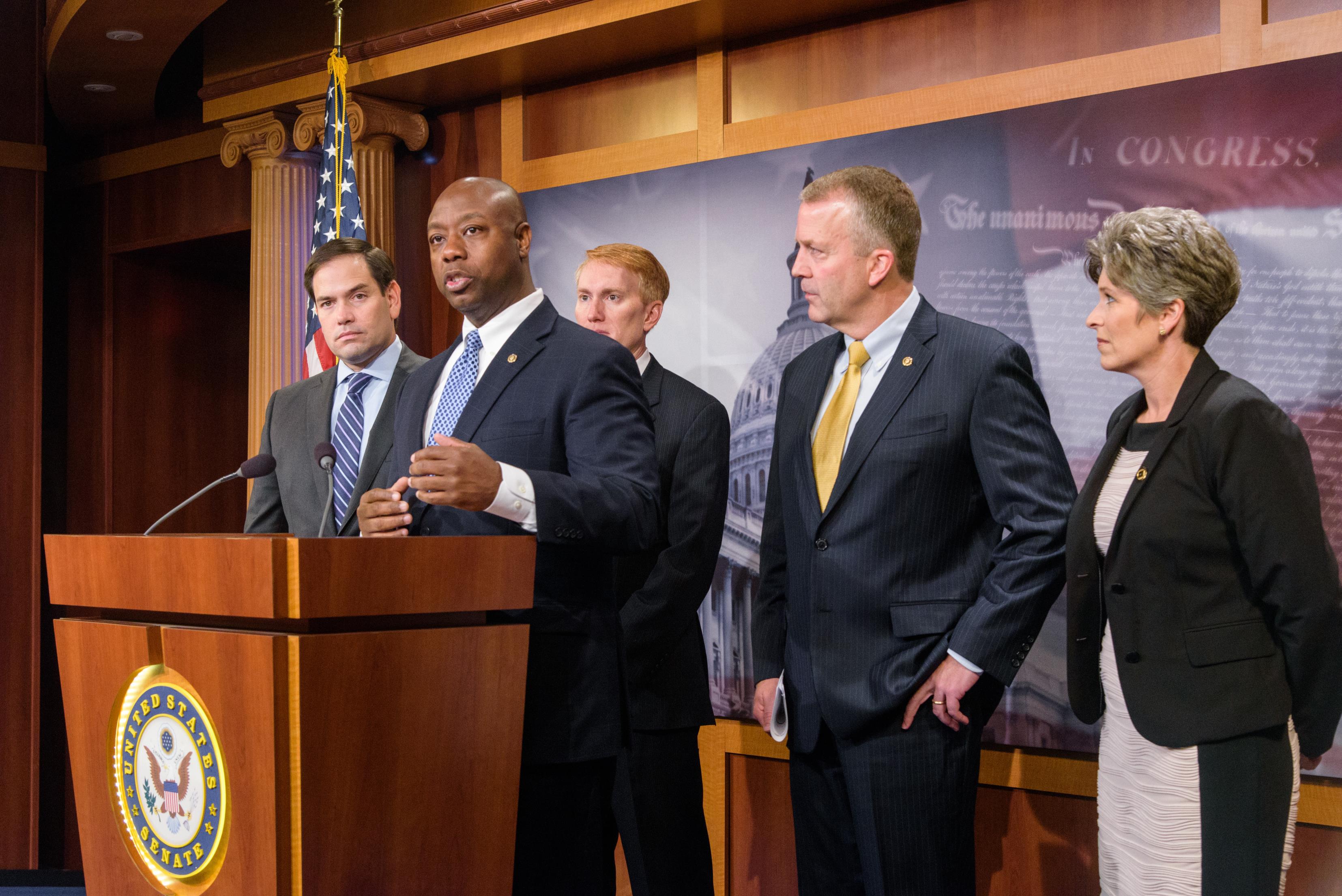|

Full
article
here.
SPARTANBURG,
S.C.
—
Tim
Scott
was
doodling
in
my
notebook.
The
Republican
U.S.
senator
and
I
were
having
dinner
before
he
and
a
few
staffers
were
to
make
the
three-hour
drive
to
Charleston,
so
he
could
sleep
in
his
own
bed
that
night.
But
first,
I’d
asked
him
to
explain
how
his
idea
to
defer
capital
gains
taxes
would
help
struggling
communities
like
the
one
we’d
just
visited
in
this
city
of
roughly
40,000
people.
…
The
idea
is
to
give
wealthy
individuals
and
corporations
an
incentive
—
in
the
form
of
reduced
tax
burdens
on
investment
profits
—
to
put
money
into
developing
low-income
areas.
Scott’s
approach
is
savvy
both
in
terms
of
business
and
in
terms
of
politics.
He
understands
business,having
owned
an
insurance
companyand
been
a
partner
in
a
real
estate
company.
And
having
worked
with
Booker,
a
Democrat
who
happens
to
be
the
only
other
African-American
member
of
the
U.S.
Senate,
Scott
has
inoculated
himself
against
the
charge
that
he’s
just
another
Republican
cloaking
efforts
to
reduce
government
in
the
language
of
helping
people
out
of
poverty.
…
On
Wednesday,
he’ll
help
announce
a
new
group
of
five
senators
who
will
call
themselves
the
Senate
Opportunity
Coalition:
Scott,
Sen.
Marco
Rubio,
R-Fla.,
Sen.
Joni
Ernst,
R-Iowa,
Sen.
Dan
Sullivan,
R-Alaska,
and
Sen.
James
Lankford,
R-Okla.
They
are
all
Republicans,
and
that’s
intentional.
“We
believe
strong
conservative
solutions
can
help
every
single
American
family,”
the
group
says
in
its
announcement.
“This
is
not
something
that
will
be
solved
with
one
bill,”
they
say.
“From
taxes
to
education,
infrastructure
to
agriculture,
we
are
each
bringing
stories
from
our
own
states
to
help
show
how
wide-reaching
our
solutions
must
be.”
There
is
some
tension
between
the
idea
that
the
group
will
introduce
“conservative
solutions”
to
poverty
while
working
with
Democratic
lawmakers,
which
Scott
told
me
is
one
of
its
goals.
But
its
intent
is
in
part
aspirational.
Republicans
don’t
often
talk
about
poverty,
and
they
strategize
even
less
about
how
to
address
it.
This
group,
which
is
Scott’s
brainchild,
aims
to
change
that.
Scott
says
that
despite
the
exclusivity
of
the
group,
including
only
Republicans,
this
isn’t
a
branding
effort.
“I’m
not
here
to
make
the
Republican
Party
stronger,”
he
says.
“I’m
here
to
make
the
country
stronger.”
Other
members
of
the
Republican
group
intersect
at
different
places
on the
continuum
of
poverty
awareness
and
action.
Ernst,
a
freshman
senator —
like
every
other
member
of
the
group
— from
rural
Iowa,
speaks
of
recent
“realizations”
about
the
solutions for
“food
insecurity”
in
her
own
state.
Lankford
is
promoting
community
nonprofits.
Sullivan’s
anti-poverty
efforts
are
centered
on
helping
a
remote
Alaskan
village
get
federal
approval
for
a
road
that
will
lower
their
fuel
and
supply
costs.
Rubio
is
seeking
to
improve
the
federal
Department
of
Housing
and
Urban
Development’s
inspection
process
for
low-income
subsidized
housing.
Hepassed
three
amendmentsin
May
toward
that
goal.
…
When
Scott
visited
a
group
here
that
is
working
to
revitalize
a
neighborhood
on
the
north
side
of
downtown
Spartanburg,
he
spoke
from
firsthand
experience
about
the
challenge
of
living
in
poverty
and
having
a
“pit
that’s
in
your
stomach
that
just
never
goes
away.”
“Anybody
know
that
feeling,
that
you
just
look
out
toward
tomorrow
and
there’s
really
no
reason
to
be
hopeful?”
Scott
asked
the
group.
“And
you
meet
someone
who
helps
to
change
that
reality,
where
tomorrow
is
not
really
filled
with
hope,
but
it’s
not
as
dark
as
it
used
to
be.
And
then
the
next
day
is
not
completely
dark.
It’s
got
shades
of
gray.
And
then
one
day
you
wake
up
and
—
it
wasn’t
overnight
—
it
was
as
if,
through
prodding
and
plodding
and
moving,
one
day
you
just
have
a
different
sense
of
what’s
possible,
not
for
the
community,
but
what’s
possible
for
you.”
…
### |